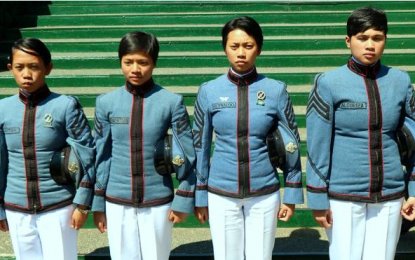Philippine News
Gender equality exists in PMA cadetship, military career
BAGUIO CITY — Gender is not an issue in training cadets at the Philippine Military Academy (PMA) and in becoming a soldier.
PMA Superintendent LTGen. Donato San Juan has assured this, ahead of Sunday’s PMA graduation rites, where four women cadets will be on the top 10 of the graduating class of 282 cadets, including 75 women cadets.
“We have had many women cadets since 1997 and they have proven themselves in the frontline service as soldiers,” San Juan said, answering queries as to whether women in the military are effective.
“It is no longer a question at this time whether they are capable of performing the duties of male officers in the frontline. They are doing that already,” he pointed out, saying women soldiers are given the same functions as their male counterparts.
“Many of the tactical officers, female tactical officers, assigned here can attest to that–that they are assigned the same as their male counterparts,” he said.
The PMA opened its doors to women cadets who reported as plebes on April 1, 1993 and graduated with the class of 1997. In 1999, PMA recorded the first female cadet to graduate at the top of her class, Ensign Arlene Dela Cruz, raising women’s status in the male-dominated institution.
San Juan said the training for both male and female cadets is equal and both are made to perform academically, and physically, including their co-curricular activities sanctioned by the institution.
The class of 2018 also marked a historical record in the academy with the most number of females graduates — 75 out of 282.
In 2017, there were 66 female graduates with 34 of them joining the Philippine Army, 16 to the Air Force, and 16 to the Navy.
Of the 75 female cadets graduating on Sunday, March 18, there are 38 joining the Army, 19 with the Philippine Air Force, and 18 with the Philippine Navy.
“We continue to maintain the regulations of having 20 percent of the cadet population to be female. As of today, we have that percentage,” the officer cited.
He added females have a high probability of graduating, which could be attributed to their being persevering and studious, aside from wanting to prove that they could survive a career dominated by men.
He assured that the academy is continuously recruiting females to join the academy to maintain the 20-percent rate.
Cadet First Class (C1CL) Micah Quiambao Reynaldo, who is finishing number 10 in the graduating class this year and a native of Bamban Tarlac, entered PMA when she was in second-year college taking up Bachelor of Science in Psychology.
“The academy is never wrong in choosing us and giving us the opportunity,” she said, referring to the chance to be a PMA cadet and join the ranks of distinguished men in the military service.
“Being a cadet in a military institution is never easy,” Reynaldo shared. “But here in the academy, we are surrounded by good mentors and good people who keep on motivating and supporting us in whatever activity we have.”
She added opportunities are all available for males and females, thus, women like here are included in the top 10.
Aside from Reynaldo, also making it in the top-10 are C1CL Leonor Andrea Cariño, number 4; and C1CL Jezaira Laquinon Buenaventura, number 6.
“The greatest hurdle (to a cadet) is to prove ourselves and that the academy is never wrong in choosing us or giving the opportunity for females to be members of the military,” she stressed.
Cadet Buenaventura of Bais City, Negros Oriental added, “I believe that after graduation, we will also have the same opportunity on the field as in the academy.”
The selection and admission of female cadets into the academy are similar for both men and women. The only difference is in the height requirement, where women must be at least 5 feet 2 inches tall, while the men have to be at least 2 inches taller than the women.
When applicants pass the written entrance examination, they are selected after thorough physical and neuro-psychiatric examinations and pre-cadet qualification interviews conducted at the Armed Forces of the Philippines Medical Center. Female appointees are not given any special treatment during those examinations.
One reason for accepting only a few female cadets is the limited availability of adequate facilities for women. For years, the PMA had been a school for men.
The female cadets said they also underwent basically the same training as their male counterparts. Adjustments were minimal, they said. Trained to become future officers of the armed forces, they undergo the same physical fitness tests, made to walk the same rugged mountain trails and dusty roads during foot marches, and attend the same academic classes as their classmates.
They said there is no distinction made between genders when it comes to punishments and demerits, as well as rewards and merits.
Just like their male counterparts, the female graduates were commissioned as regular officers in the Armed Forces of the Philippines. Together with their male counterparts, they will stand among the revered alumni and be stalwart defenders of the academy’s ideals of courage, integrity, and loyalty.






















